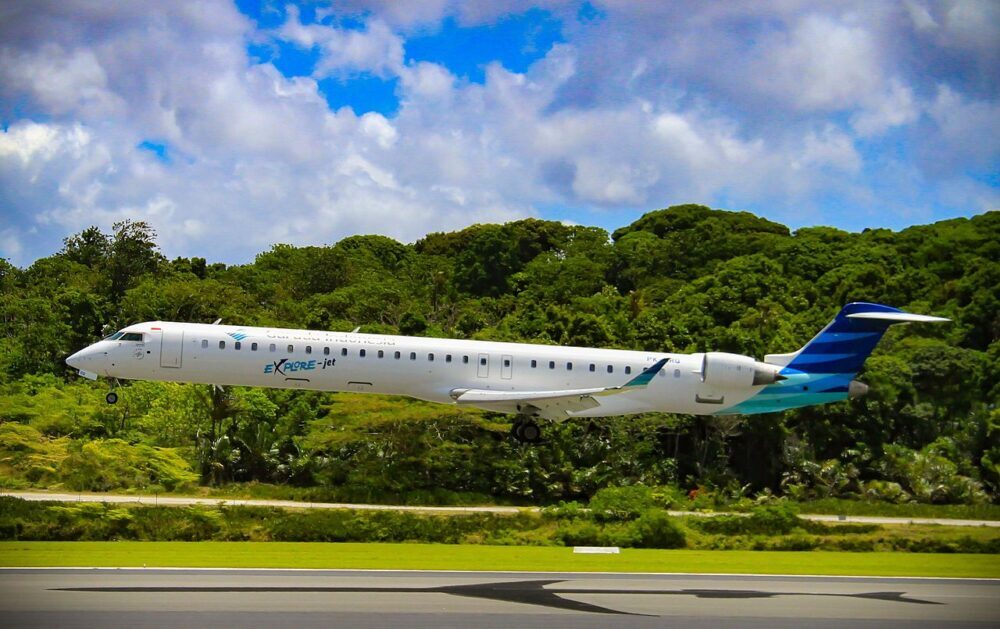JAKARTA-What’s known is that Garuda Indonesia did a deal with Canada’s Bombardier to acquire six CRJ1000 aircraft through Export Development Canada (EDC). Those planes include PK-GRA, PK-GRC, PK-GRE, PK-GRF, PK-GRG, and PK-GRH. Then, Garuda Indonesia also did a second deal to lease a further 12 Bombardier CRJ1000 planes from Nordic Aviation Capital (NAC).
Garuda Indonesia is reportedly in talks with the EDC over early payment settlements for the first six Bombardiers. That leasing deal is under investigation by Britain’s Serious Fraud Office (SFO). However, the SFO investigation covers more than the 2011 Bombardier deal. Five procurement processes involving different manufacturers have been under the microscope. The airline has some form in this regard. In May last year, Garuda’s CEO from 2005 to 2014, Emirsyah Satar, was jailed for eight years following a dodgy deal relating to aircraft and aircraft engines coming from Airbus and Rolls-Royce.
What’s also clear is that the leasing firm Garuda Indonesia wants to send the 12 CRJ1000 planes back to, Nordic Aviation Capital, is not under investigation.
“NAC is not a party to any investigation into the selection of the aircraft by Garuda in 2012, and there has been no allegation of any wrongdoing on the part of NAC in relation to the placement of the aircraft,” NAC says in a statement.
Early termination will save $220 million, says Indonesian Government Minister
Last week, Indonesia’s State-Owned Enterprise Minister Erick Thohir said the following, according to Antara:
“We refuse to be harassed. First, Bombardier is entangled in a legal case. Secondly, this is a force majeure situation due to the pandemic,”
“Of course, both Garuda and NAC have repeatedly negotiated (on the issue). Unfortunately, early termination (of the lease) has yet to receive a response.
“If we terminate it now, until the end of the contract period, we will be able to save more than US$220 million. This is part of the effort to curtail losses from the use of these planes at Garuda Indonesia.”
The problem is that Garuda Indonesia wants to hand back the planes with clean bills of health – at least from the SFO and investigatory point of view. But all is not well at the airline. Garuda Indonesia’s passenger numbers were down 66.1% last year to 10.8 million. The number of flights operated was down 44.1% to 130,362. Passenger loads on those flights averaged 45.2%, down 29.1% on 2019 levels.
CRJ1000 lease termination not about bribery, rather a cash crunch at Garuda Indonesia
At a briefing last week, current Garuda Indonesia CEO, Irfan Setiaputra, cut to the chase. The CRJ1000s were costing US$30 million annually to operate and losing the airline money. With just 96 seats and limited baggage capacity, the aircraft type never slotted well into Indonesia’s normally busy domestic aviation market. That mismatch begs the question: why did Garuda Indonesia make the CRJ1000 deal in the first place?
Negotiations with NAC have reportedly been ongoing, but no satisfactory outcome could be achieved. Garuda’s owner, the Government of Indonesia, decided to hand the 12 planes back to NAC. Depending on what reports you read, the termination decision came arbitrarily or after extensive negotiations.
NAC, for its part, remains unimpressed. To begin with, the global leasing business is now tainted by a bribery and money laundering scandal. Secondly, they don’t expect a scandal external to their business to be grounds for walking away from a contractual obligation. The aircraft lessor expects Garuda Indonesia to stick by its obligations and terms of the lease agreement. NAC’s response to Minister Thohir’s announcement last week was this;
“NAC has continued these discussions, but there has been no agreement to date, and no termination notice has been received. The lease agreements thus remain in full force and effect, and NAC expects Garuda to continue to honor its contractual commitments.
“While NAC is sympathetic to the commercial difficulties of Garuda, it is confident of its position and absolutely determined to protect its commercial interest.”

